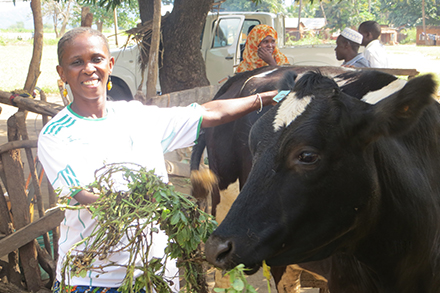Earlier this year, the Kilosa region experienced torrential rains for over three weeks. These heavy downpours caused the river Mkondoa, which streams from the Ukaguru Mountains, to burst its banks, flooding the Kilosa plains.
Kilosa has been experiencing floods in the past few years, but this year the district recorded one of the most severe floods. The floods left many families homeless, vulnerable and dependent on handouts from well wishers and Government-rationed meals every day.
Heifer Tanzania began working in 12 villages Kilosa District in 2013 to improve the livelihoods of vulnerable people who have been affected by the recurring floods. Heifer’s work in Kilosa consists of dairy cattle in seven villages and poultry in five villages.
Rehema Mondo, a Heifer project participant, is one of the flood victims in Madudu village. She uses what she has to spread the Heifer spirit of giving. Rehema received a Heifer, training on organic gardens and learned the importance of passing on the gift last year in July. Prior to joining the Heifer project, Rehema and her family would go for days without food and the floods only made it worse. Many of her neighbors experienced the same thing and a number of them found themselves homeless after severe flooding.
“The floods this year were worse than what we had experienced before. I was asleep one night and heard heavy crashing at the roof top. It was then that I realized it was a heavy downpour. In less than two hours, I could see everything in the house floating. All my chickens, utensils, everything I had, had been washed away," Rehema said. "All I had left were the clothes I was wearing. When I went outside, I was lucky to find Shelly (the name she gave to her heifer) standing outside. Shelly had survived the floods."

The farmers in Kilosa thank Heifer for reaching out to them last year, because, with the animals they received, they are able to get through the devastation of the floods. The farmers get milk, which supplements the small food rations they are getting from the Government. They are also able to sell the milk and use the money to buy food, renovate their houses and replace necessities lost in the floods. Even though the project in Kilosa is still young, participants have experienced direct impact and positive change. Many, like Rehema, are practicing what they learned from Heifer.
"When you have lost hope and all you have to a disaster like this, you look forward to any kind of gift you can get, however small. It is through Heifer, though, that I realized how important it is to give," Rehema said.
After Rehema’s cow calved, Rehema started giving half of the milk she got to her neighbors. One of her next-door neighbors has been bedridden for the last month. Rehema takes him a liter of milk every day to help him get better. She has also made it her routine to give milk to all families in the neighborhood who have children who need the milk. She gets an average of six gallons per day and consumes or gives away about half. She uses the remaining half to make sour cream/milk—a skill she learned from Heifer’s training—which she sells at 50 cents per liter.
From proceeds from the sale of milk, Rehema will next lease land to grow rice. She also has an organic garden, which ensures availability of vegetables for sale and better nutrition for her family.
"The best thing Heifer gave me is not just an animal that gives me milk and money but the 'spirit of giving.' It is through that and the animals we received that our hopes were restored," she said. 'They gave us future to look forward to. I look forward to passing on the heifer that was recently born."
Story and Photos by Rachael Singo, Communications Officer, Heifer Tanzania